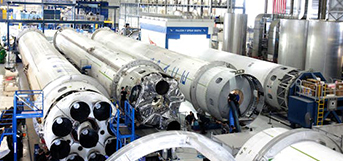Custom software development has advanced significantly from basic programming to complex systems capable of handling intricate commercial enterprise strategies. Services are more advanced now than in the past, utilizing contemporary technology to provide unique solutions that satisfy specific customer needs.
Software development is dramatically transforming due to AI and ML, making it faster, more intelligent, and more adaptable. These advancements are encouraging developers to create intelligent systems that can grow and learn over time, paving the path for software that will evolve on its own in the future.
The role of AI in custom software development
Enhancing efficiency with AI
Automated coding and debugging
AI-powered tools are capable of handling a variety of coding jobs, including producing basic code and seeing and fixing errors. These tools accelerate development and reduce errors, resulting in higher-quality code.
AI-powered testing and quality assurance
AI improves software testing by automating the creation and execution of test cases. It can optimize testing efforts and anticipate possible areas of failure, resulting in more dependable software. AI-driven quality assurance systems regularly test and monitor applications, which spot problems before they become serious.
Personalization and customization
Adaptive user interfaces
AI makes it possible to create adaptive user interfaces, changing based on the preferences and activities of the user. By providing a customized experience, these interfaces make software simpler to use and comprehend.
Designing user experiences with AI
AI uses user data to inform design decisions, ensuring that software meets user requirements and expectations. This data-driven approach produces user experiences that are more effective and captivating.
Machine Learning’s impact on development services
Predictive analytics in software development
Forecasting project timelines
Project managers can make more accurate plans by using machine learning (ML) models to forecast future deadlines based on existing project data. Better resource allocation and deadline management are made possible by these predictive capabilities.
Risk reduction and management
By examining historical data, machine learning algorithms can detect possible hazards in software development projects. By using these insights, teams may minimize delays and cost overruns by proactively addressing problems.
Smart automation
Simplifying development processes
By automating schedule assignments like code reviews, integration, and deployment, machine learning (ML) simplifies development operations. Developers can now focus on more intricate and creative approaches to software development because of this automation.
Automating routine tasks
ML lessens developers’ workload and boosts productivity by automating repetitive tasks. Faster development cycles and a shorter time to market for customized software solutions are the results of this performance.
How AI and ML in software development are revolutionizing the industry
Faster time to market
Tools for AI and ML speed up the development process, enabling agencies to release products faster. Businesses benefit from this speed because it allows them to react swiftly to market demands.
Cost estimation and precise planning
The capacity of AI and machine learning to support accurate planning and cost estimation is one of the main advantages of these technologies in software development. It might be challenging to estimate the time and money needed to finish a project in traditional software development. This is because there are a lot of unknowns involved. However, this is no longer a problem because of the strength of AI and machine learning.
The time and expense needed to finish a project can be precisely predicted by developers with the use of AI and machine learning technologies. This is a result of these algorithms’ capacity to learn from historical data. Because of this, they can spot patterns and trends that would otherwise be invisible to the human eye.
Data-driven strategies
AI and ML help businesses make informed decisions by providing valuable insights from massive volumes of data. Custom software development projects are more viable thanks to these data-driven strategies.
AI-assisted strategic decision making
AI’s capacity to support strategic decision-making is among its most significant uses in software development. AI, in particular, can be used to find trends and patterns in data that would be hard to find otherwise. This can assist developers in making better choices about target audiences, feature priority, and product design.
Predictive models are also being developed using machine learning. Based on past data, these models can be used to forecast future occurrences. This is helpful when making decisions that will affect the bottom line of the business and when planning.
Automated software testing with AI support
Software developers can automate the testing of their apps with the use of artificial intelligence. In automated software testing, AI can play a variety of roles:
- To write test cases that are more likely to uncover bugs
- To identify and generate test data for use in functional tests
Some AI algorithms can even be used to do exploratory testing automatically. This is where software testing jobs that call for intuition or creativity can benefit from the usage of artificial intelligence. An AI system is more likely to find flaws than a human tester since it can investigate an application in novel and creative ways.
However, human testers should not be replaced by artificial intelligence in software development. Certain activities, including recognizing emotions or comprehending the user interface, are beyond the current capabilities of artificial intelligence. Artificial intelligence should therefore be viewed as a technology that can assist in automating software testing and enhancing its precision.
DevOps automation
Automated DevOps is another significant way AI in software development affects the sector. The process of automating the software development lifecycle is referred to as DevOps. This covers tasks like source control, deployment, build automation, and monitoring. You can expedite the development process and lower the frequency of deployment problems by automating these procedures.
For this, several AI-based solutions are available, including Microsoft Azure Machine Learning Studio and IBM Watson. These applications can keep an eye on your software development process and spot possible issues before they become serious ones. In order to guarantee that your software is always current, they can also automate the distribution process.
Discover the Possibilities of AI and ML in Your Next Project
Are you ready to explore how AI and ML can transform your software development? Our experts at People10 can help you identify opportunities and craft innovative solutions that drive success.
Upcoming developments in AI and ML for custom software
The changing roles of developers in this environment must be taken into account when we examine the cutting-edge AI and ML technologies that have the potential to completely transform the creation of custom software.
Utilizing these developments will require AI-augmented teams and new skill sets, guaranteeing that software development stays at the forefront of efficiency and innovation.
AI and ML in edge computing
Edge computing reduces inactivity and advances execution by bringing AI and ML capabilities closer to information sources. This change benefits applications that require fast reactions by enabling real-time trading and analysis.
Machine Learning and quantum computing
Quantum computing has the potential to revolutionize machine learning by understanding complex issues that are currently intractable. Though it is still in its infancy, this concept has great promise for the development of custom software in the future.
Federated learning
With federated learning, numerous servers or devices can use separate data samples to train their own localized models without exchanging them. This method enhances data security, and because of its intricacy, it can be used in extremely sensitive fields like healthcare and banking, among others.
Developing environments driven by AI
How developers write and test code is changing as a result of the emergence of AI-driven integrated development environments (IDEs). These environments greatly increase development speed and code quality by utilizing AI to provide real-time code suggestions, mistake detection, and performance optimization.
Choosing the right development partner for ai/ml projects

- Clarify objectives: Clearly outline your project goals, the problems you aim to solve, and the desired outcomes. Establish a timeline and identify key deliverables, which will serve as a foundation for evaluating potential partners.
- Research companies: Conduct thorough research to identify software development firms with expertise in AI and ML. Look for companies that demonstrate experience in delivering innovative solutions and adapting to evolving technologies.
- Review portfolios: Examine the company’s previous work, especially projects similar to yours or within your industry. Their portfolio should showcase expertise in AI/ML-driven solutions and provide confidence in their ability to meet your expectations.
- Seek collaboration: Choose a partner that values collaboration and strategic input, not just one that executes tasks. A true partner will align with your vision and proactively suggest ways to enhance your project.
- Check specialization: Verify that the company’s expertise aligns with your specific AI/ML requirements. Whether it’s natural language processing, predictive analytics, or machine learning models, specialization matters.
- Evaluate communication: Communication is critical for project success. Assess how responsive, clear, and proactive the company is during initial discussions to ensure smooth collaboration throughout the development cycle.
- Assess methodologies: Look into their development processes, favoring agile or iterative methodologies. These approaches work well for AI/ML projects, allowing for flexibility and continuous improvement.
- Prioritize security: AI and ML projects often deal with sensitive data. Confirm that the company follows strict data protection and cybersecurity practices to safeguard your project and user information.
- Understand team dynamics: Learn about the company’s team structure and culture. A well-coordinated team with cross-functional expertise in AI/ML will ensure the seamless execution of your project.
- Discuss support: Ensure the company provides ongoing testing, updates, and maintenance after deployment. Continuous improvement is especially crucial for AI/ML solutions to stay effective and relevant.
Unlock the Power of Innovation with the Right Partner
At People10, we specialize in crafting cutting-edge AI/ML solutions tailored to your unique needs. From concept to deployment, our team ensures seamless execution and lasting impact.
Conclusion: Leading the future of innovation with People10
As the world embraces the transformative potential of AI and ML, the opportunities for innovation in software development are limitless. At People10, we don’t just follow trends—we pioneer tailored solutions that empower businesses to thrive in this dynamic landscape. Whether it’s developing intelligent systems, optimizing processes, or delivering personalized experiences, our expertise in AI and ML ensures that your vision is transformed into a future-ready reality.
Ready to unlock the full potential of AI and ML in your next project?
Partner with People10 and let’s create software solutions that are smarter, faster, and built to evolve with your business.
Author
Shrutha Sekharaiah brings over 13 years of experience in delivering innovative, scalable solutions. His broad expertise in technology and focus on collaboration and mentorship drive the creation of robust systems enhancing efficiency and performance.



